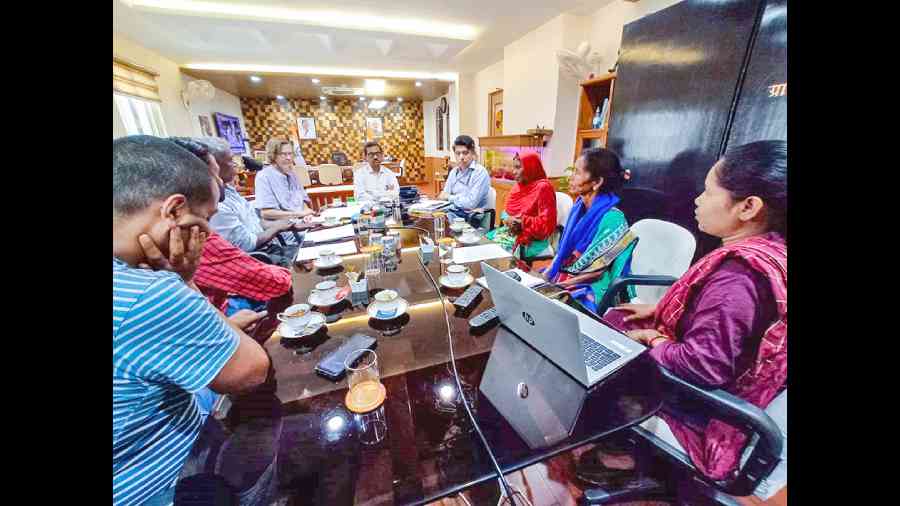A delegation of NREGA workers, trade unions, organisations and individuals engaged in public action on the 100-day rural jobs scheme met Shailesh Kumar Singh, secretary in the rural development ministry in New Delhi, on Tuesday and highlighted how the absence of a reliable and timely wage payment system was affecting the scheme.
“We draw your attention to the fact that NREGA cannot succeed unless a reliable and timely system of wage payments is put in place. Delays and uncertainty in wage payments defeat the main purpose of the programme and sap workers’ motivation — not only as workers but also as planners, monitors and auditors,” the NREGA Sangharsh Morcha, a national platform of workers’ collectives, said in its letter to Singh.
The Morcha is holding an indefinite protest at Delhi’s Jantar Mantar — which entered its 27th day on Wednesday — against several issues related to the 100-day-a-year job scheme, such as online attendance through the National Mobile Monitoring Software (NMMS) that was made mandatory since January 1, the Aadhaar-Based Payment System (ABPS) that came into effect on February 1, and inadequate allocation for the NREGA.
During the meeting with Singh and Amit Kataria, joint secretary in the department, the delegation members stressed that the Centre should stop relying on technological solutions to address the problem of corruption and instead focus on social audits and other participatory forms of anti-graft measures.
The Morcha has been suggesting that the government abide by the legal obligation of 1 per cent funding for social audits and strict action against corrupt elements for better effectiveness of the scheme.
“This rarely happens as of now,” said the release issued by the organisation. The freeze on the flow of funds to Bengal under the NREGA — due to alleged irregularities in implementing the scheme — came up for discussion during the meeting as the representatives from the state raised the pending wages owing to the central government not releasing money for over 15 months.
The fact that the situation will further inconvenience the workers due to the failure to allot funds for the financial year 2023-24 also featured in the discussion.
According to economist Jean Dreze, who was part of the NREGA Sangharsh Morcha delegation, the ministry kept its cards close to its chest.
On the discontinuation of NREGA funding for Bengal, secretary Singh remained non-committal despite forceful pleas for an end to the impasse from the entire delegation, including a lawyer and two other members from Bengal.
The bureaucrats representing the ministry didn’t give any assurance on the other demands — like scrapping of the Aadhaar-based payment system or making it non-compulsory, removal ofthe attendance app, and adequate funding for the scheme.
“Today, a wholly unacceptable situation has developed where, aside from payment delays, NREGA workers often end up not being paid at all due to NMMS — or ABPS-related glitches,” the Morcha wrote in the letter that was submitted to the ministry.
Poor Internet connectivity has hobbled the online registration of attendance and led to workers not getting paid after being erroneously marked absent. It also shared with Singh the report of a survey, conducted at seven worksites in Bihar’s Muzaffarpur, that revealed that 34 per cent of the work days were not recorded at all due to NMMS-related problems.
As wage payment based on the attendance app requires timely uploading of workers’ photographs twice a day, the workers are often denied their rightful wage payment in areas with poor connectivity. The Morcha representatives reiterated their demand for an upward revision in NREGA wages.
“They have not increased in real terms for the last 12 years. At the very least, payment of state-specific minimum wages should be ensured as a first step,” the letter said.











